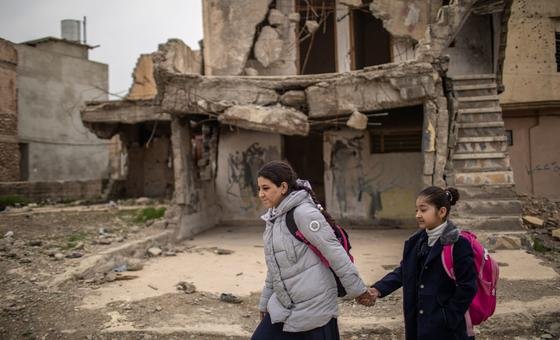The new UN special representative for Iraq, Mohammed al-Hassan, said in his first address to the Security Council on Friday: “As you have heard many times, the Iraq of today is not the Iraq of 20 years ago. It is not the same as it was five years ago.”
“Iraq is safer, more stable and more open today despite the many obstacles facing the country.”
Mohammed Al Hassan is also the head of the United Nations Assistance Mission in Iraq (UNAMI). He expressed confidence that the country is capable of “overcoming the crisis and meeting the challenges towards building a more secure, bright and promising future”.
Nationwide census, some key resource investments
Special Envoy Mohammad Al Hassan highlighted recent important milestones, starting with the successful conduct of the national census in November, the first since 1987 to include the semi-autonomous Kurdistan Region in the north.
Early estimates show that Iraq’s population has nearly doubled in the past 30 years to more than 45 million, and “decision-makers will now be able to make plans based on reliable data and statistics.”
Major political appointments
Another important development was the election of a new speaker of the Iraqi parliament’s House of Representatives in October, “after a year of vacancies and various failed attempts.”
In addition, Prime Minister Mohammad Shia al-Sudani continued to invest in major infrastructure projects across the country, including the construction of roads, bridges, schools, and transportation networks.
Promotion of regional peace and integration
“The Iraqi government has shown its determination to act as a strong voice for regional peace and stability in a region ‘on fire,'” said Iraqi Ambassador Mohammad Al-Hassan.
The prime minister has consistently called for an end to regional tensions, stressing the need to respect Iraq’s sovereignty and territorial integrity.
Additionally, the Iraqi government is looking beyond the current conflict and leveraging regional partnerships to establish the country as an important corridor for transportation, energy and trade.
“Such initiatives highlight the importance of Iraq’s efforts for regional integration and prosperity,” he said.
Progress in the Kurdistan region
Mohammad al-Hassan also drew attention to “positive progress” in the Kurdistan region, where parliamentary elections were held on October 20 “after two years of negotiations and delays”, re-establishing the legitimacy of institutions there.
The United Nations Mission in Iraq provided electoral support for the process, in which more than 2 million people participated. Voter turnout reached 72 percent, up 12 percent from the previous election. Women won 31 of the 100 parliamentary seats in these elections, more than the minimum quota of 30 percent.
He said, “When the discussions are going on among the political parties to form a new regional government, it is the responsibility of the political parties to give women access to political positions and give them a place on the platform.”
Additionally, the prime minister’s post-election visit to the regional capital Erbil was “an important step in promoting joint talks between the two sides to resolve several pressing issues.”
Corruption and threats to women’s rights
However, Mohammed Al Hassan also said that these positive developments are being overshadowed by the dangers posed by ongoing systemic corruption, even as the government continues its efforts to fight corruption.
He stressed the need for “comprehensive changes and reforms that will promote accountability, promote meritocracy, improve transparency and strengthen governance,”
“I am confident that the government is taking promising steps in this direction,” said Mohammad Al Hasan.
Controversy over marriage laws
He said there had been extensive public debate on the proposed amendment to the Personal Dignity Act and significant international attention on the issue, which would have far-reaching impacts on women and girls.
UN Deputy Secretary-General Amina Mohammed recently observed that the law’s provisions include lowering the legal age of marriage for girls from 18 to nine years.
UNAMI consulted extensively with Iraqi stakeholders on the drafting of such provisions.
Displaced people ‘deserve better conditions’
The Iraqi envoy pointed out, among other things, that the influence of the terrorist group Daesh is still visible in the camps where thousands of displaced people live.
They are mainly members of the Yazidi minority community. These people have seen such a harsh lifestyle before.
“This situation in Iraq is unacceptable. Iraq can do better. I am confident that Iraq will be able to provide a better standard of living for those who have already suffered,” he said.
He called on Iraq to make concrete investments to create conditions for the return of Yazidis and others.
Withdrawal from Syrian camps
“And we must not forget the Iraqi civilians who are still in al-Hal camp in the northeastern region of Syria,” Mohammad al-Hassan said, referring to Syria.
He drew attention to the location, where thousands of people of various nationalities, including children, are being detained on charges of involvement with Daesh.
Although Iraq is one of the few countries working to repatriate its citizens, more steps are needed to speed up the return from the “hell-like conditions”.
“We have received new commitments from the Iraqi government and institutions to return Iraqi civilians from al-Hol and other camps in northeastern Syria – possibly by the end of 2025…” he said.
He urged other countries to do the same.

